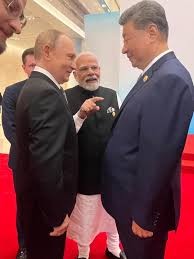{The New York Times}, the self-proclaimed newspaper of record of the Anglo-American establishment has on its masthead, the pompous statement: All the news that's fit to print. It should read: All the news that fits what we want you to know, we print.
In this fast-changing world, it is not just what you know that can do you great harm if it is false, but also what you don't know, or more precisely, what the ruling establishment does not want you to know or even consider. What we publish here is precisely that—what the Anglo-American establishment does not what you to consider, because it runs contrary to their scripts for reality. Such "news" might cause you to think for yourself, and that is dangerous to an establishment that clings to power on the basis of its ability to manipulate people's perceptions.
So what we present here you are not likely to see anywhere else, at least not all in one place. It is not the news that is "fit" (what does that even mean, and who determines it?), or what fits into Pidgeon-holed views of reality. For these troubled times, it is we believe, what you need to know, but which no one wants you to know. Then, we let you draw your own conclusions and make your own informed choices about what you think. We don't tell you what or how to think but merely urge you to think, for yourself. So, check it out. It is often raw and unfiltered, but it is, we believe: The World, As It Really Is...
Feel free to send us your comments, suggestions of what you want to find out that we have not covered. Stay engaged.
Sept. 3—Chinese President Xi Jinping and Russian President Vladimir Putin me Sept. 2, the third day of President Putin’s exceptional four-day visit to China. They first met in the Great Hall of the People with their larger delegations, which involved most of President Putin’s cabinet, which accompanied him on this trip. Twenty different agreements were signed, including an important, legally binding memorandum on the construction of the Power of Siberia-2 pipeline. There have been negotiations on this matter for several years, but some concerns on the Chinese side with regard to costs now seem to have been overcome.
The two leaders underlined the importance of the relationship, pledging to strengthen high-level exchanges, mutual support, and coordination for greater development of bilateral relations in the future. Xi greeted Putin as a “lao pengyou,” an old friend. Xi said: “Chinese-Russian relations have stood the test of the international situation, and serve as a model of interstate relations of eternal good-neighborliness, friendship, comprehensive strategic interaction, mutually beneficial cooperation and mutual benefit.”
Putin praised Xi for hosting this year’s Shanghai Cooperation Organization (SCO) Summit, the biggest in history. “Russia is willing to maintain strategic coordination with China, strengthen high-level contacts and expand practical cooperation in various fields to promote the further development of high-level bilateral relations,” said Putin. He also called Xi’s Global Governance Initiative “timely and necessary,” and believes it “will play an important part in addressing the global governance deficit.” Putin said that under the leadership of the two heads of state, Russia-China relations have reached an historic high.
After the meeting in the larger format, the two Presidents, with a smaller retinue, retired to the government residence at Zhongnanhai. Putin was accompanied by Foreign Minister Sergey Lavrov, Defense Minister Andrei Belousov, Presidential assistant Yury Ushakov, and Deputy Chief of Staff of the Presidential Administration Maxim Oreshkin. With President Xi Jinping were Foreign Minister Wang Yi and director of the CCP Central Office Cai Qi, and effectively Xi’s Chief of Staff. Here they continued discussion on international and regional issues of mutual interest. The bilateral cooperation agreements cover the areas of energy, space, artificial intelligence, agriculture inspection and quarantine, health, scientific research, education , and media sectors. These included various projects such as the establishment of Russian-Chinese pilot and demonstration zones for agricultural cooperation in the Russian Far East; strategic cooperation in the peaceful use of nuclear energy; and the integration of the Russian scientific instrument, the Lunar Dust Monitor, into China’s Chang’e-7 spacecraft mission. They also included establishing a Russian-Chinese Institute for Fundamental Research and the joint financing of scientific research projects.
Sept. 3—Russian Foreign Minister Sergey Lavrov, who gave an interview Sept.1, to the popular Russian TV program “Moscow.Kremlin.Putin” after the conclusion of the Shanghai Cooperation Organization summits (SCO and SCO Plus), was asked for his view of how everything had turned out. He was speaking to a Russian audience, but it is the citizens of Western nations being told by their governments and media that “the disruptors” of the world were plotting against them, who most need to hear his summary of what actually took place: a discussion of what Western nations need to do!
“A substantive discussion took place, which clearly demonstrated through the lens of various initiatives that the movement is directed toward the formation of a multipolar world. Western countries are attempting to obstruct this process. In order to preserve their dominance, they resort not to dialogue or fair competition, but to direct blackmail, pressure, and sanctions. We are witnessing the abuse of the dollar’s role in global affairs and the United States waging tariff wars against virtually everyone else.
“The general consensus was that such actions have nothing to do with defending the West’s legitimate rights in the global economy and politics but serve merely as instruments of suppressing competitors. It is obvious to all that these competitors have not only grown stronger, but in many areas are already surpassing the historical collective West.
“The main outcome of the SCO and SCO Plus summits is the shared determination to uphold our rights, without yielding to provocations, in full compliance with international law, the UN Charter, and the principles of the international monetary, financial, and trade systems—the very principles once promoted by the West itself.”
by Marathon Girl
Sept. 3—Concluding his remarks to the SCO-Plus meeting in Tianjin on September 1, Chinese President Xi Jinping said:
“An ancient Chinese philosopher said of the importance of principles, ‘Uphold the Great Principle, and the world will follow.’ In two days, China will commemorate solemnly the 80th anniversary of the victory of the Chinese People’s War of Resistance Against Japanese Aggression and the World Anti-Fascist War. Many colleagues will join us in Beijing. We are ready, together with all parties, to uphold courageously the great principle and the common good of the world, promote a correct historical perspective on World War II, resolutely safeguard the fruits of our victory in the War, and deliver more benefits to the entire humanity through the reform of the global governance system and the building of a community with a shared future for humanity.”
In Chinese philosophy “the great principle” has a specific meaning, having to do with the heavenly origin of things and the principles of creation, or natural law. This concept is in harmony with the last of the Ten Principles put forth by Schiller Institute founder Helga Zepp-LaRouche regarding the perfectibility of man, “that man is fundamentally good and capable to infinitely perfect the creativity of his mind and the beauty of his soul, and being the most advanced geological force in the universe, which proves that the lawfulness of the mind and that of the physical universe are in correspondence and cohesion, and that all evil is the result of a lack of development, and therefore can be overcome.”
With that dedication, it’s no wonder that Presidents Putin, Xi, and Indian Prime Minister Modi were all smiles as they greeted one another at the history-shaping Shanghai Cooperation Organization Summit of 2025. And why not be happy? The efforts of these nations to cooperate in great projects of economic development, scientific discovery, and culture have lawfully created a situation in which these nations, combined, yield greater economic, and even military, strength than the combined powers of the bankrupt West. For the knee-jerk conformists, who stop listening after the phrase “global governance,” presuming that Presidents Putin and Xi mean Bertrand Russell’s “World Government,” please listen closely to what these leaders are saying, and watch what they are doing. They are speaking of a new order of human relations, not based on an arbitrary “rules-based order” imposed through starvation and war, but a system based on mutual respect for each nation’s security and economic interests, and an appreciation of the richness of the diversity of humanity as a whole.
In his November 29, 2004 feature “The Coming Eurasian World,”, Lyndon LaRouche described the phenomenon of the morally bankrupt West as follows: “Let such caricatures of poor King Canute as President George W. Bush, Jr., howl their denials, while they can still be heard. Let him shriek in futile rage against those thunderous winds of chaos which were already hurling themselves against the increasingly bankrupt national financial systems of the world. That chaos, now excited to the greater turbulence caused by the desperate antics of such poor, enraged fools as he, now descends with its own, added, uncontrollable fury upon our hapless, present world monetary-financial system.”
But today, it is not all of the “national financial systems of the world” that are bankrupt, but merely those of the delusional Western nations whose leaders cling to failed axioms, and non-principles, like “might makes right,” which has been exposed to the eyes of the world as a deadly fraud, with genocidal consequences.
President Xi addressed this as well, by insisting that the scourge of fascism not be forgotten, and that the history of World War II not be rewritten by the very same financial and political interests that gave us Adolf Hitler and militarist/fascist Japanese Empire.
The NATO press propaganda machine of Western Europe and the United States has been caught completely off guard, having believed in their own magical powers to control the narrative, and therefore history, and are left, really, with nothing to say.
If the people of the West would have the humility to look inside themselves and find their better angels rooted in the Greek Classics, the Italian Renaissance, and the principles of the American War of Independence against the British Empire, they would discover that the new strategic and economic architecture coming into being is not directed against them, or against anyone; and if they would uphold the principle that they claim to hold so dear, that “All Men are created equal” (Men as in mankind, the species, male and female), and stop the slaughter of innocents in Palestine and everywhere else on the planet, they would find themselves welcome to participate in unleashing a new era for the development of mankind. Otherwise, the immortal Friedrich Schiller has warned, “Denn das Gemeine geht klanglos zum Orkus hinab.”
Sept. 3—Thousands of Israeli high school students staged protests and strikes on the first day of school Sept. 1, demanding the government be forced to accept a ceasefire and end the war against Gaza and a hostage release deal. Organizers of the strike estimate that “hundreds and even thousands of students” from about 70 schools did not show up to their classrooms, locked the gates to their schools, blocked highway intersections and held rallies in Tel Aviv and other cities as part of the protest, Haaretz reported.
Rotem Richeter, one of the student leaders addressing a protest in front of the Ministry of Education, speaking in English, called on the international community to help end the war.
Students were “supposed to start 12th grade today. Instead, I’m here. I am here because the contract that binds a state and its citizens has been breached,” he said. "I am here because no one is spared—not the hostages, who have been subjected to torture for almost two years now; not the bereaved families, who have suffered unfathomable tragedy; not the survivors of October 7, the orphaned children, the soldiers, or even my friends and me—we are all but pawns in the government’s cynical and destructive game.
“And this is just the Israeli side: Palestinian children, my age and younger, are being killed by the thousands, and the numbers continue to rise. I call on you, the international community, to take action and join us in our efforts to put an end to the war, stop the bloodshed, and bring the hostages back home.”
Another, Naomi Or Afek warned at the same rally that the two-year long war has become “routine. And routine is the most terrible thing, because routine means indifference. And indifference will be our end. I am not willing to live in such a routine, and I am not willing for my children to grow up into it and for many more like me.”
Sept. 3—The Washington Post exposed this week a plan, ostensibly backed by Wall Street and sections of the U.S. government, to redevelop Gaza for the benefit of private investors, which they claim would create a virtual American colony and the "Trump Riviera" playground for the Golden Billion.
The lengthy, detailed story is primarily based on "a 38-page prospectus seen by the Washington Post [which] envisions at least a temporary relocation of all of Gaza’s more than 2 million population, either through what it calls ‘voluntary’ departures to another country or into restricted, secured zones inside the enclave during reconstruction.”
According to the prospectus, “Those who own land would be offered a digital token by the trust in exchange for rights to redevelop their property, to be used to finance a new life elsewhere or eventually redeemed for an apartment in one of six to eight new ‘AI-powered, smart cities’ to be built in Gaza. Each Palestinian who chooses to leave would be given a $5,000 cash payment and subsidies to cover four years of rent elsewhere, as well as a year of food.” Other sources have put that figure as high as $9,000.
Voluminous details follow but it is not until near the end what the strategic intentions behind the plan are, aside from the profit motive. “The plan talks of Gaza’s location ‘at the crossroads’ of what will become a ‘pro-American’ region, giving the United States access to energy resources and critical minerals, and serving as a logistics hub for the India-Middle East-Europe Economic Corridor (IMEC) that was first announced during the Biden administration but derailed by the Israel-Gaza war.”
Behind the plan, called the “Gaza Reconstitution, Economic Acceleration and Transformation Trust” (or GREAT Trust), are reported to be the same group of synarchist financial interests that created the Gaza Humanitarian Foundation operation, which now regulates the starvation in Gaza, as a for-profit food distribution network linked to Washington and the Israeli military. Trump’s February vow to own and redevelop Gaza offered both a green light and a road map for the group of Israeli businessmen, led by entrepreneurs Michael Eisenberg, an Israeli American, and Liran Tancman, a former Israeli military intelligence officer.
No one would speak to the Post about the plan on the record and it is not clear if it was discussed at the Aug. 26 White House meeting attended by, among others, Tony Blair and Jared Kushner, who are known to support similar schemes. Perhaps most appealing, it purports to require no U.S. government funding, while creating significant profit to investors, the Post says. “Calculations included in the plan envision a nearly fourfold return on a $100 billion investment after 10 years, with ongoing ‘self-generating’ revenue streams,” the prospectus reportedly says.
And what of the 2 million Palestinians whose lives are being destroyed in Gaza? While the plan offers the “option” from some of them to stay, it is more profitable for them to leave: “The plan estimates that every individual departure from Gaza would save the Trust $23,000, compared with the cost of temporary housing and what it calls ”life support" services in the secure zones for those who stay."
Sources report that the investment group behind this looting scheme has been in contact with the Netanyahu government, as well as with leaders of the fascist Israeli settlers movement, who have plans to create Israeli settlements inside Gaza, Those would be located in the north, away from the resort communities created in the south, along the Mediterranean coast. Supposedly, the group would sell land to the settlers for development, who would use funds that would be backed by bonds from the Israeli government.
A source contacted who has also seen the prospectus, and who has spoken to people involved, say they envision the area to be secured by American guarantees, and it could be an autonomous region, not part of Israel, but part of a new Palestinian state, where taxes paid would go both to investors and the Palestinian state. The source said the deranged people behind this scheme say that the revenue generated might actually make a Palestinian state economically viable.
Sept. 3—The French government wants the country’s hospitals to be prepared for a potential scenario to care for thousands of wounded soldiers, including troops from other NATO countries, according to a letter sent this summer from the French Health Ministry, reported in the French press over the past few days.
The French satirical weekly Le Canard Enchaîné, often used to publish factual leaks from the Armed Forces, broke the news on Aug. 27. The magazine reported that it saw a letter sent by the French Health Ministry to regional health authorities on July 18, which stated that hospitals must be prepared by March 2026 in the event of a “major deployment” of the military. “Signer of the Treaty of Washington, France is called to take any measure, including the use of force, to respond to any attack directed at one or several member states of NATO,” says the letter.
Labor Minister Catherine Vautrin confirmed the information but emphasized that there is “no need to sound alarmist,” adding that “it is perfectly normal for the country to anticipate crises.” Regardless, the letter is part of a propaganda campaign to support a NATO build up for a war with Russia, following NATO expected defeat in its proxy war against the Russian in Ukraine. The casualties are speculated to occur as a result of a Russian attack on western Europe, which is itself a total fantasy.
Acting under the mandate of the French National Defense and Security General Secretariat, the Health Ministry claims that France could be the hinterland of a large-scale conflict. Therefore, the country must be ready to accommodate wounded French and foreign soldiers. Hospitals need to be able to care for 100-500,000 men within a period of 10 to 180 days. Civilian medical personnel should be prepared for incorporation of Military Health Infrastructures. Those treated today in Military Hospitals for cancer are called “to heal faster or to die in a civilian hospital,” sarcastically notes Le Canard. Part of the plan, emergency medical centers to be created near ports or airports so that foreign soldiers can be sent on to their countries of origin. The letter also mentions training to make civil healthcare providers aware of “the limitations in wartime” (i.e., triage in wartime conditions).
In an interview with the news channel BFMTV, Vautrin confirmed the information. “It is perfectly normal for the country to anticipate crises and their consequences,” she added. “This is part of anticipation, just like strategic stockpiling. I was not yet in office when Covid-19 broke out, but let’s not forget that at the time we were at a loss for words to describe how unprepared the country was.”
Sept. 3—The list of Houthi ministers killed in the Aug. 29 strikes by Israel includes, besides Prime Minister Ahmed Ghalib Al-Rahawi, the ministers of information and foreign affairs along with various others, particularly economics-related functions. In total, nine ministers were killed.
The blood-lusting Butcher of Gaza, Israeli Prime Minister Benjamin "Bibi" Netanyahu called the strike a “fatal blow” to the group, which has launched missile attacks on Israel in support of the Gazan's under Israeli genocidal attack. “We are doing what no one has done before us, and this is just the beginning of the blows to the senior officials in Sanaa—we will reach everyone,” Netanyahu claimed.
The Aug. 28 strike did not appear to have killed officials who oversee attacks on Israel—in particular the group’s chief of staff, reportedly the main target of the bombing, and the defense minister. Kan, Israel’s public broadcaster, reported on Aug. 31 that Israel held its weekly cabinet meeting at a secure location following the attack.
The group has vowed revenge. “We promise to God, to the dear Yemeni people and the families of the martyrs and wounded that we will take revenge,” the head of the group’s supreme political council Mehdi Al Mashat said in a video message posted on Telegram.
Sept. 3—The long anticipated bilateral meeting of Indian Prime Minister Narendra Modi and Chinese President Xi Jinping took place Aug. 31, along the sidelines of day one of the Aug. 31-Sept. 1 Shanghai Cooperation Organization summit, in Tianjin, China. The Indian Ministry of External Affairs release a readout on the meeting which stated: “Both leaders welcomed the positive momentum and steady progress in bilateral relations since their last meeting in Kazan, [Russia] in October 2024. They reaffirmed that the two countries were development partners and not rivals, and that their differences should not turn into disputes. A stable relationship and cooperation between India and China and their 2.8 billion peoples on the basis of mutual respect, mutual interest and mutual sensitivity are necessary for the growth and development of the two countries, as well as for a multipolar world and a multi-polar Asia befitting the trends of the 21st century...
“Prime Minister underlined the importance of peace and tranquility on the border areas for continued development of bilateral relations. The two leaders noted with satisfaction the successful disengagement last year and the maintenance of peace and tranquility along the border areas since then. They expressed commitment to a fair, reasonable, and mutually acceptable resolution of the boundary question proceeding from the political perspective of their overall bilateral relations and the long-term interests of the two peoples. …”
In June 2020, there was an incident along the Line of Actual Control (LAC), high up in the Himalaya Mountains, which designates the border between India and China, with some 20 deaths among Indian and China soldiers. India and China have had Special Representatives working for some to resolve the dispute, which in the past has flared into a major conflict between the two nuclear powers.
One sign of progress is the renewal of Kailash Manasarovar Yatra, which is a pilgrimage for Hindus, Buddhists and Jains to Mount Kailash and the sacred Lake Manasarovar in the Autonomous region of Tibet which China had suspended access since 2020.
The Indian foreign ministry statement declared: “The two leaders noted the need to strengthen people-to-people ties through direct flights and visa facilitation, building on the resumption of Kailash Manasarovar Yatra and tourist visa. On economic and trade relations, they recognized the role of their two economies to stabilize world trade. They underlined the need to proceed from a political and strategic direction to expand bilateral trade and investment ties and reduce [India’s] trade deficit [with China].”
Sept. 3—Russian President Vladimir Putin told the Shanghai Cooperation Organization Heads of State Council Meeting Sept. 1 that the SCO “a powerful driver for global development processes.” He covered many points, including the basis for resolving the Ukraine crisis, which he said was created by NATO's expansion eastward, which he termed an existential threat to Russia. On the SCO economic perspective, he proposed building a new investment platform for the SCO member nations, similar to what he is proposing for the BRICS, and stated that the SCO should replace the failed, destructive “Eurocentric and Euro-Atlantic” models in Eurasia.
Putin opened his speech by invoking the May 9 celebrations marking the 80th anniversary of Victory in the Great Patriotic War “and the defeat of Nazi Germany” that were held in Moscow, and praised the Sept. 3 “large-scale events [that] will take place in Beijing to commemorate the victory over Japanese militarism and the 80th anniversary of the end of World War II.”
He also singled out for praise the Tianjin Declaration, which the SCO is issuing at the conclusion of this conference, and the SCO Development Strategy through 2035, a ten-year perspective for the SCO’s future growth.
Putin stated that “the pace of cooperation within the SCO is truly impressive,” and cited that the industrial output of the SCO in 2024 grew by 4.6%, which dwarfs anything achieved in the so-called “industrial nations.”
Putin, who is this year’s SCO “honored guest,” unveiled sweeping proposals for the SCO in investment and credit, which have the support of the SCO leadership. He asserted, “We advocate the issuance of joint bonds by the SCO member states, the establishment of our own payment, settlement and depository infrastructure, and the creation of a bank for joint investment projects. These measures will increase the efficiency of our economic exchanges and protect them from external market fluctuations.” The idea of an SCO bank for joint investments is included in the organization’s final “Tianjin Declaration.” At the BRICS summit in October 2024 in Kazan, Russia, host President Vladimir Putin urged the creation of a BRICS investment platform, which has yet to be developed.
Putin said the SCO is ushering in a new system of cooperation and development, to replace the harmful “Eurocentric” model that now dominates. “There is no doubt that the SCO makes a tangible contribution to strengthening an atmosphere of cooperation and mutual trust across the entire Eurasian continent,” Putin emphasized. In doing so, "it helps lay the political and socioeconomic foundations for a new system of stability, security and peaceful development in Eurasia—a system that would replace outdated Eurocentric and Euro-Atlantic models, take into account the interests of the widest possible range of countries, and be genuinely balanced, thus preventing attempts by some states to ensure their own security at the expense of others."
Sept. 3—Chinese President Xi Jinping proposed Sept. 1 the Global Governance Initiative (GGI) at the “Shanghai Cooperation Organization Plus” meeting in Tianjin. The Global Governance Initiative is the fourth major initiative President Xi has proposed, starting with the Global Development Initiative in 2021, the Global Security Initiative in 2022, and the Global Civilization Initiative in 2023.
“I look forward to working with all countries for a more just and equitable global governance system and advancing toward a community with a shared future for humanity,” Xi said in his address to the SCO meeting. He highlighted the five principles for the Global Governance Initiative:
“First, we should adhere to sovereign equality.
“Second, we should abide by international rule of law.
“Third, we should practice multilateralism.
“Fourth, we should advocate the people-centered approach.
“Fifth, we should focus on taking real actions.”
Sept. 3—At the Shanghai Cooperation Organization summit in Tianjin, China, host President Xi Jinping chaired the Heads of State Council, and delivered the keynote address Sept. 1.
Xi reported that since its founding 24 years ago, the SCO had established a series of firsts: “We were the first to set up a military confidence-building mechanism in our border areas, turning our extensive borders into a bond of friendship, mutual trust and cooperation...We were the first to launch Belt and Road cooperation...We were the first to put forth the vision of global governance featuring extensive consultation and joint contribution for shared benefit as an effort to practice true multilateralism.”
A quarter of a century later, “The SCO has grown into the world’s largest regional organization, with the participation of 26 countries, cooperation covering more than 50 areas, and a combined economic output of nearly US$30 trillion. Its international influence and appeal are increasing day by day.” Moving forward, Xi argued that the SCO should strengthen its advantages: “We should make the pie of cooperation bigger, and fully utilize the endowment of every country, so that we can fulfill our responsibility for peace, stability, development and prosperity in the region.”
Xi added: “Second, we should pursue mutual benefit and win-win results. We need to better align our development strategies and promote the high-quality implementation of the Belt and Road Initiative, so that in planning and building relevant projects together and benefiting from them together we can strengthen the momentum of regional development and improve the well-being of the people. We should leverage the strengths of our mega-sized markets and economic complementarity between member states, and improve trade and investment facilitation.”
This means developing all of Eurasia—for starters: “The vast land of Asia and Europe, a cradle of ancient civilizations where the earliest exchanges between the East and the West took place, has been a driving force behind human progress.” Xi stressed that “Going forward, China … will provide RMB2 billion yuan in grant to SCO member states within this year, and will issue an additional RMB10 billion yuan in loan to the member banks of the SCO Interbank Consortium over the next three years.”
Xi observed in conclusion, “As a Chinese saying goes, ‘Where will prevails, no boundary holds.’|"
Sept. 3—The Houthi Ansar Allah movement confirmed Aug. 30 that Houthi Prime Minister Ahmed al-Rahawi was killed by an Israeli air strike on Thursday night, Aug. 28. In a statement, the Houthi-run Yemeni presidency said that al-Rahawi, along with other ministers, were targeted during a routine government workshop assessing their performance, reported the Middle East Eye. Some ministers were killed or wounded, though their identities were not disclosed.
Despite the attack, the presidency insisted that the government would continue to function without disruption. “We remain steadfast in supporting Gaza,” the statement added.
The Israeli strike came following a Houthi missile attack on Israel a few days earlier, which for the first time included cluster warheads.
The head of Yemen’s Supreme Political Council Mahdi al-Mashat confirmed that the government of Change and Construction will continue its work in a caretaker capacity, stressing that the blood of al-Rahawi and his fellow ministers will serve as a catalyst for resilience, rebuilding, and continuing the path, reported Al Mayadeen.












